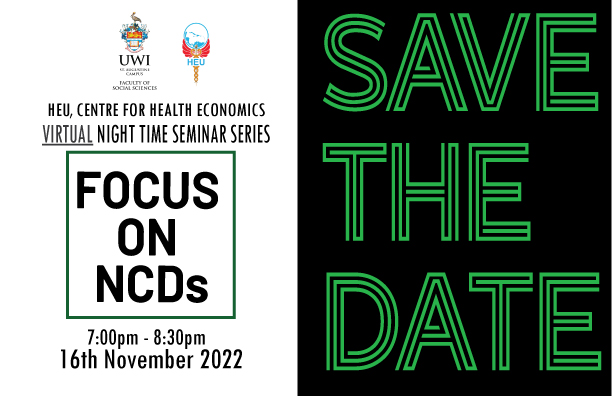Night-time Seminars
The HEU Centre’s NTSS was the brainchild of Prof. Karl Theodore, and it was created out of a need for a forum for the presentation of research findings in the area of Health and Social Security for the University community. The NTSS quickly evolved since its inception and today it functions as a forum for the sharing of research findings and discussion on key policy issues in the area of Health and Development that are relevant to the Caribbean by Policy Specialists, Practitioners, Researchers and members of Academia.
In addition to the University Community, The NTSS attracts an audience from the private and public sector, civil society organizations as well as regional and international agencies.
The HEU NTSS has, over the years, created a platform for open and candid discussion and exchange on major health related topics such as Health Sector Reform and Health Financing, Non Communicable Diseases, HIV, Dementia and Mental Health, as well as related areas such as Social Security and Pensions Reform, Ageing and the Sustainable Developmental Goals. This forum has provided valuable guidance and feedback to inform not only the national and regional research agenda, but also policy direction and implementation at both the national and regional level.

Upcoming Seminar
The HEU's Night Time Seminar resumes on November 16 2022 from 7 to 8.30pm. Click here to Register!

Previous Presentations
-
"Policy and Operational Aspects of a National Health Insurance System (NHIS) for Universal Coverage in Trinidad and Tobago", Presenters Dr. Kenwyn Nicholls, International Health Consultant and Dr. Stanley Lalta, Research Fellow, HEU, Centre for Health Economics, June 2016.
- “Population Ageing in Trinidad and Tobago: Responding to the Needs of an Ageing Population,” Dr. Jennifer Rouse, Director, Division of Ageing, Ministry of the People and Social Development, Trinidad and Tobago, April 2014.
- “Ageing Caribbean Populations and Implications for Health Management and Financing,” Dr. Stanley Lalta, Research Fellow, HEU, Centre for Health Economics, the University of the West Indies, St. Augustine Campus, April 2014.
- “Population Ageing in Trinidad and Tobago: Changes in the Age Structure and its Implications,” Dr. Jennifer Rouse, Director, Division of Ageing, Ministry of the People and Social Development, Trinidad and Tobago, October 2013.
- “Development Matters: The Social Brain and Mental Health,” Professor Gerard Hutchinson, Head, Department of Clinical Medical Sciences, Faculty of Medical Sciences, the University of the West Indies, St. Augustine Campus, September 2013.
- “A Case for Universal Screening for Diabetes in Pregnancy in Trinidad and Tobago,” Professor Surujpal Teelucksingh, Professor of Medicine, Clinical Medical Sciences, Faculty of Medical Sciences, the University of the West Indies, St. Augustine Campus, July 2013.
- “The Caribbean Public Health Agency (CARPHA): Vision to Reality,” Dr. James Hospedales, Executive Director, CARPHA, May 2013.
- “Tackling Non-Communicable Diseases (NCDs) in Trinidad and Tobago - Going Beyond the Biomedical Model of Health: Type 2 Diabetes as a Case Study,” Dr. May Moonan, Clinical Lecturer in Public Health Medicine, the University of Liverpool, United Kingdom, May 2012.
- “The Challenges of Caribbean Public Health,” Sir George Alleyne, Chancellor, the University of the West Indies, April 2010.
- “Cost Effectiveness Analysis of Intensive Care: Applying Disability-Adjusted Life Years (DALYs),” Dr. Hariharan Seetharaman, Professor of Anaesthetics, Anaesthesia and Intensive Care Unit, Clinical Surgical Sciences, Faculty of Medical Sciences, the University of the West Indies, St. Augustine Campus, January 2010.
- “Delegated Decentralization: The State of Health and the Effect of Decentralization on Process Indicators and Redeemability and Recommendations for Delegated Decentralization,” Dr. Mandreker Bahall, Lecturer, School of Medicine, Faculty of Medical Sciences, the University of the West Indies, St. Augustine Campus, August 2009.
- “Health Outcomes: The First 2000 Years,” Professor Paul Kind, Economist, University of York, United Kingdom, March 2009.
- Symposium entitled, “Why Should I Care?" – A Symposium on HIV and AIDS to UWI Students hosted by the Health Economics Unit in collaboration with the UWI Guild of Students. November 2007.
- “Comparative Global Health Systems: Issues of Equity and Efficiency”, Dr. William Mc Greevey, Director Development Economics, for Futures Group and adjunct Professor, Department of Global Health, George Washington University, March 2006.






